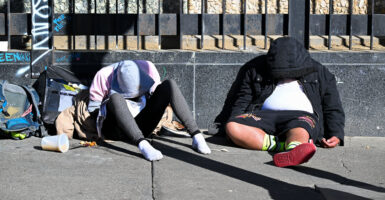California spends an astounding amount of money to combat homelessness. Presumably.
I know this is a crazy question to ask, but does all that spending actually do anything to reduce the amount of homelessness?
The answer from California’s state agencies tasked with running homelessness programs seems to be no more than a shrug. According to a recent audit, the state stopped tracking the effect of its homelessness programs five years and $24 billion ago.
“More than 180,000 Californians experienced homelessness in 2023—a 53% increase from 2013,” the audit report reads. “To address this ongoing crisis, nine state agencies have collectively spent billions of dollars in state funding over the past five years administering at least 30 programs dedicated to preventing and ending homelessness.”
Yet, the audit found that there was little way to assess the programs because the agencies tasked with overseeing this massive endeavor stopped tracking its effect long ago.
From the information auditors were able to gather, they concluded that in many cases homelessness got worse.
“According to the audit, California’s homelessness population grew 32% over the last five years, and by 53% over the last 10,” The National Desk reported.
A spokesman for the California Interagency Council on Homelessness said in an interview with Fox News that the blame is with local governments that “are primarily responsible for implementing these programs and collecting data on outcomes that the state can use to evaluate program effectiveness.”
OK, fine. But shouldn’t that mean they put pressure on state governments to include that data or maybe just cut off the spigot for those that don’t comply?
It appears that some pressure has been put on cities to show their work. Los Angeles reportedly has agreed to a large-scale audit of its own homelessness programs after spending hundreds of millions of dollars on them.
But the question remains: Why hasn’t this data been tracked if California officials are serious about curbing homelessness, a problem that has mushroomed in LA and many other California cities?
Why is it that an endless supply of taxpayer money flows toward homelessness regardless of outcome?
Poverty programs in California appear to be increasingly just pure redistribution of wealth. That’s probably fine with the Golden State’s ruling powers that be. Our society certainly has become more accustomed to the idea of permanent entitlements.
But it’s worth noting that way back in the mid-1960s when various programs were created in President Lyndon Johnson’s “War on Poverty,” they were portrayed as an answer to a problem. Welfare was sold not as an entitlement, but as a way to cure society of various social ills, to help people escape poverty.
What we got instead appears to be more social ills, and in California’s case, more poverty.
The Golden State frequently is atop many measures of state poverty levels. And California’s generous programs for the homeless certainly haven’t led to less homelessness. Instead, these programs have made the state the homelessness capital of the nation, with roughly 30% of the entire U.S. homeless population, according to The Associated Press.
Yeah, I know that California has great weather in some locales. But 30% of the nation’s homeless seems more than a bit high, given that the state makes up just over 11% of the U.S. population.
I think the answer to the riddle of why California hasn’t bothered to track homelessness spending is simply that the state is accustomed to one-party rule with little accountability.
Left-wing politicians in California know that they can sell homelessness programs to constituents who are happy to virtue signal about it. Now they’ve created an industry based on an endless labyrinth of government agencies and nongovernmental organizations that claim they’re solving the problem without showing the results of their work.
They’ve created a vast, unaccountable homelessness-industrial complex.
One would hope this audit would be a wake-up call to Californians. The state’s budget woes are becoming severe. Residents, besides maybe the homeless and illegal aliens, have been fleeing the state in droves.
Will California’s lawmakers make a pivot?
I wouldn’t count on it, but even in the most dysfunctional, one-party systems there’s pressure to conform to reality. In San Francisco, there’s been some opposition to the left-wing insanity that’s made the city more dangerous and less livable for normal people.
I don’t just want to go with the cliché about California running out of other people’s money. I’m sure the state will find creative ways to sponge residents and keep the money flowing.
But this is far from a model of government worth emulating, and it’s hard to imagine this level of waste continuing in perpetuity without consequences.

























